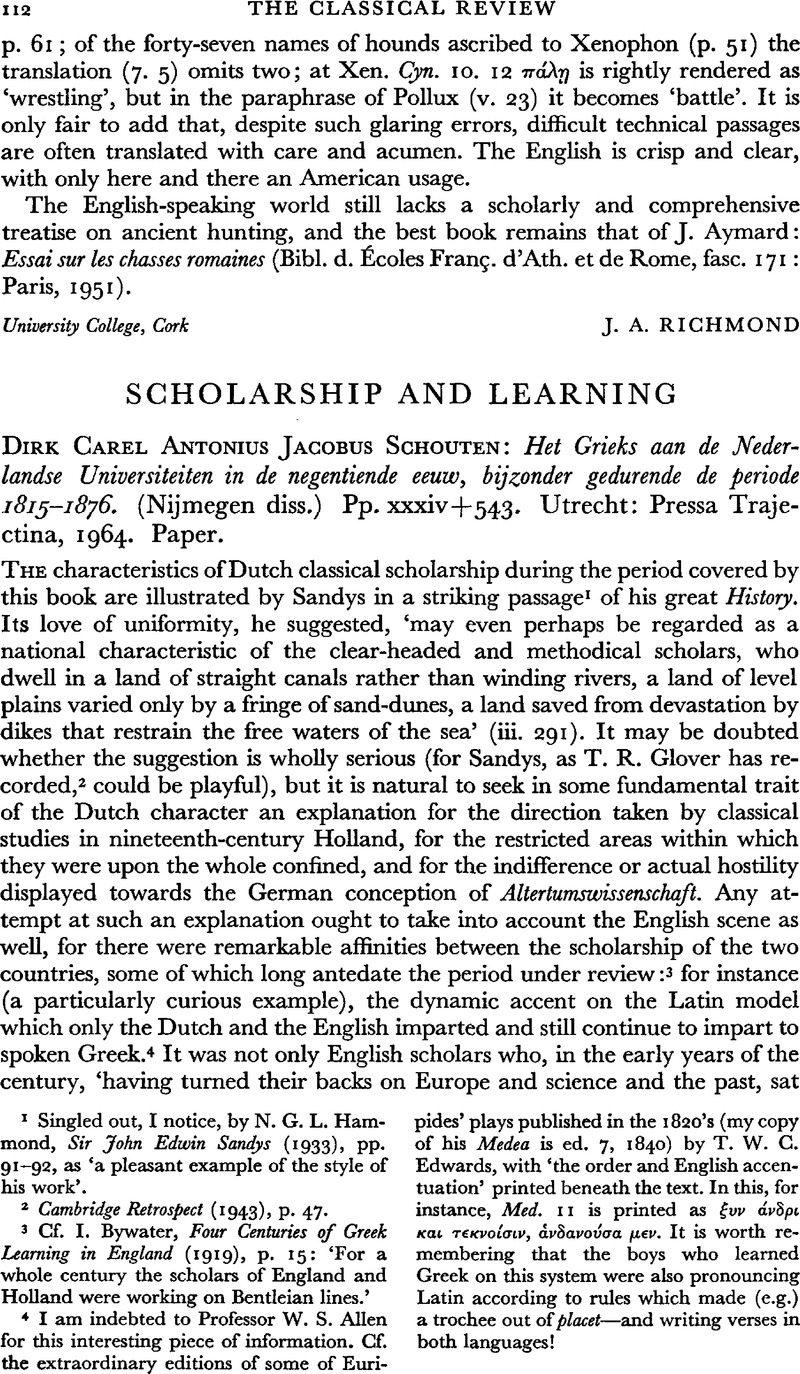No CrossRef data available.
Published online by Cambridge University Press: 27 February 2009

page 112 note 1 Singled out, I notice, by N. G. L. Hammond, Sir John Edwin Sandys (1933), pp. 91–92, as ‘a pleasant example of the style of his work’.
page 112 note 2 Cambridge Retrospect (1943), p. 47.
page 112 note 3 Cf. I. Bywater, Four Centuries of Greek Learning in England (1919), p. 15: ‘For a whole century the scholars of England and Holland were working on Bentleian lines.’
page 112 note 4 I am indebted to Professor W. S. Allen for this interesting piece of information. Cf. the extraordinary editions of some of Euripides' plays published in the 1820's (my copy of his Medea is ed. 7, 1840) by T. W. C. Edwards, with ‘the order and English accentuation’ printed beneath the text. In this, for instance, Med. 11 is printed as ξυν ⋯νδρι και τεκνο⋯σιν, ⋯νδανο⋯σα μεν. It is worth remembering that the boys who learned Greek on this system were also pronouncing Latin according to rules which made (e.g.) a trochee out of placet—and writing verses in both languages!
page 113 note 1 ‘[Gaisford's] vast folios … belong to an eighteenth-century world in which the editor felt no need to concern himself with archaeology, philology, or comparative religion’ (H. Lloyd-Jones, Greek Studies in Modern Oxford [1961], p. 5). Cobet had no use for comparative philologists (Schouten, p. 175).
page 113 note 2 Schouten, p. 199 and n. 19; ‘a new light broke in upon him when he first came across the Miscellanea Critica of Richard Dawes’ (Bywater, op. cit. 17).
page 113 note 3 Concentration on certain linguistic and metrical techniques is a humanistic inheritance: failure to adjust to the march of history is peculiarly English. The characteristic may already be seen in the precepts of Charles Hoole (17th century): ‘the scanning and proving verses, being the main end of reading this Author [Ovid], should more then any thing be insisted upon whilst they read it’ (quoted by M. L. Clarke, Classical Education in Britain [1959], p. 39). The narrow expertise entailed by this concentration was of course complemented by great ignorance in other fields: even Porson despaired of the lyric metres of Greek drama (D. L. Page, ‘Richard Porson’, Proc. Brit. Acad. xlv [1960], 229); cf. F. M. Cornford, The Cambridge Classical Course (1903), p. 13. On the idea of ‘scholarship’ cf. also Sandys, i, 1–4; M. Pattison, Essays (1889), i. 207.
page 114 note 1 In fairness it ought to be mentioned that Mommsen said much the same of Lachmann (Wilamowitz, p. 59).
page 114 note 2 Karsten was clearly a meritorious figure. In his rectorial oration of 1847 (De cautione adhibenda in veritatis indagatione) he seems ready to be anticipating the later excesses the Age of Confidence (Wilamowitz, p. 61).
page 114 note 3 An amusing reminiscence of how textual criticism was learned at Leiden under Cobet may be found in a pamphlet (apparently not known to Schouten) by his official panegyrist (Bursian's Jahresbericht lxi [1889], 53 ff.), J. J. Hartman, De Phaedri Fabulis Commentatio (Leiden and Leipzig, 1890).